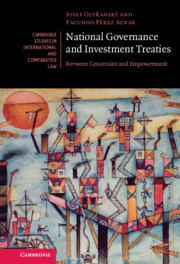Book contents
- National Governance and Investment Treaties
- Cambridge Studies in International and Comparative Law
- Reviews
- National Governance and Investment Treaties
- Copyright page
- Dedication
- Contents
- Acknowledgements
- Abbreviations
- 1 National Governance and Investment Treaties
- 2 Situating the Engagements with the Investment Treaty Regime in Argentina, the Czech Republic, India, and Mexico
- Part I Discursive and Ideological Effects of Investment Treaties on National Governance
- 3 Narratives of Progress and Economic Development
- 4 Narratives of Education and Constraint
- Part II Formal and Informal Institutional Effects of Investment Treaties on National Governance
- Index
3 - Narratives of Progress and Economic Development
from Part I - Discursive and Ideological Effects of Investment Treaties on National Governance
- National Governance and Investment Treaties
- Cambridge Studies in International and Comparative Law
- Reviews
- National Governance and Investment Treaties
- Copyright page
- Dedication
- Contents
- Acknowledgements
- Abbreviations
- 1 National Governance and Investment Treaties
- 2 Situating the Engagements with the Investment Treaty Regime in Argentina, the Czech Republic, India, and Mexico
- Part I Discursive and Ideological Effects of Investment Treaties on National Governance
- 3 Narratives of Progress and Economic Development
- 4 Narratives of Education and Constraint
- Part II Formal and Informal Institutional Effects of Investment Treaties on National Governance
- Index
Summary
In this chapter, the most common narratives relating to the function and purpose of investment treaties are analysed that emerged from our data. The overarching discursive framework of the narratives about IIAs’ purpose was marked by the faith in their important role in economic development of the studied countries (IIAs as articles of faith). This broader view was undergirded by the idea of a linear and progressive march of history, in which earlier state and economic formations are eventually transformed into the universally superior social order of capitalist legality, rule of law, and good governance (IIAs as progressive economic development). This broader progressive narrative about IIAs was translated in more specific narratives about IIAs in specific temporal and spatial contexts. International investment agreements were, thus, viewed either as a natural necessity, as a necessary (lesser) evil in the march towards economic progress, or simply as benign instruments that merely reflect the progress already undertaken. Finally, IIAs were also signed to express cultural affinity and played a symbolic role in showing political like-mindedness (IIAs as symbolic tokens of political affinity). In some cases, IIAs helped to project countries’ self-perception of their position in the stylised international relation hierarchy as ‘developed states’.
Keywords
- Type
- Chapter
- Information
- National Governance and Investment TreatiesBetween Constraint and Empowerment, pp. 81 - 104Publisher: Cambridge University PressPrint publication year: 2023

